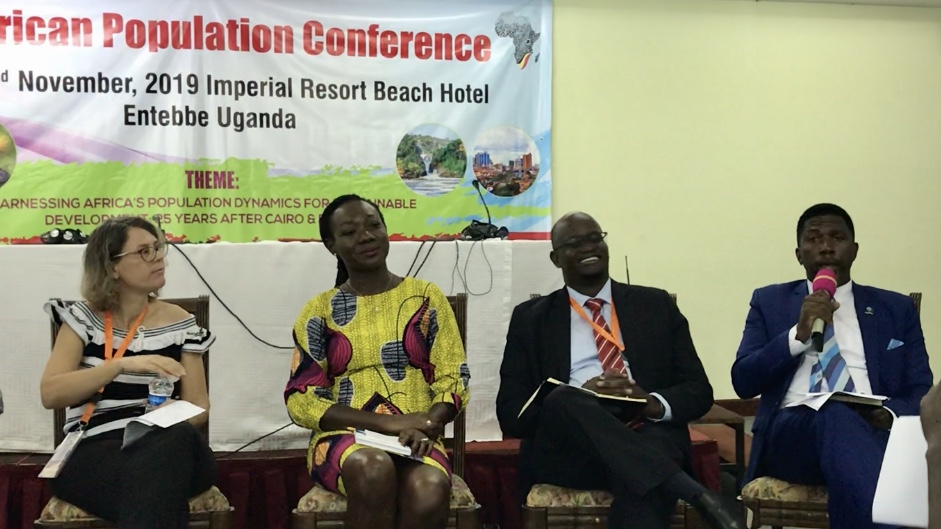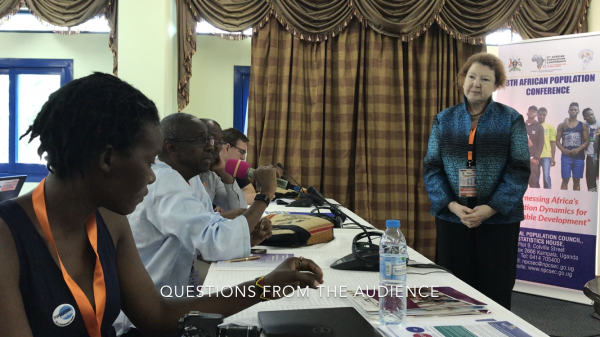IUSSP Urban Family Planning session at the8th African Population ConferenceEntebbe, Uganda, 19 November 2019
The IUSSP Panel on Family Planning, Fertility and Urban Development organized a session on Urban Family Planning on Tuesday 19 November at the 8th African Population Conference in Entebbe, Uganda. The session brought together researchers, programmers and policy makers to discuss the need for more attention to the role family planning can play in improving the lives of urban dwellers in Africa’s cities. It was an interactive session of questions and responses moderated by Judith Helzner, IUSSP Urban FP Project Coordinator.
The session, which was video recorded , began with an overview of urbanization trends and contraceptive prevalence in urban areas. John Cleland, Emeritus Professor of Medical Demography, London School of Hygiene and Tropical Medicine, covered general trends in urbanization in Europe and the United States in the 18-19th century comparing it with contemporary urbanization trends in Africa. He corrected the general assumption that urban growth is mostly fueled by rural to urban migration, when, in fact, births contribute more to urban population growth. While urbanization has generally been accompanied by lower fertility rates in most of the world, at least for Africa, urbanization has not led to the low fertility rates experienced by other countries and regions going through the demographic transition. In many African cities, fertility declines appear to have either stalled or not yet materialized – why?
see video Part 1
Clementine Rossier, Associate Professor, Institute of Demography and Socioeconomics, University of Geneva, drawing on extensive research from Demographic Surveillance Sites (DSS) in poor urban neighborhoods in Ouagadougou, Burkina Faso, spoke about trends in the use of modern contraception there. In Ouagadougou, use of modern contraception has increased markedly in recent years but there remain many barriers for women and couples to access and effectively use modern contraception. Some barriers are related to access and supply of services such as poor quality, while others are due to a lack of knowledge and confidence in the safety of methods. In addition, other obstacles related to gender roles such as women’s lack of power in relationships with their male partners. One recent effort to overcome cost barriers has been the fact that since June 2019 all contraceptive methods are offered free of charge.
 The Challenge Initiative (TCI) has been trying to address urban poor residents’ access to modern contraception through a “business unusual approach” to the provision of family planning services in Africa and South Asia. TCI projects work in collaboration with local leaders requiring the “buy-in” of municipalities, who must invest their own resources in family planning services in order to receive additional TCI support. Paul Nachae, of TCI East Africa, explained how the project works. His Honor Ronald Balimwezo, of Nakwara District of Kampala, which is collaborating with TCI, explained why his municipality is investing in family planning services for its citizens.
Finally, IUSSP Urban FP Fellow, Nkechi Owoo, Department of Economics, University of Ghana, drawing on her research linking urban fertility to household food security and child malnutrition in Nigeria, discussed the links between urban fertility and food security that provide strong arguments for families and governments to invest in family planning services. She set this in the context of the country’s rapid urbanization rate, more than doubling from only 2-in-10 Nigerians living in urban areas in the 1980’s, to 5-in-10 Nigerians in those areas in 2018.
The second half of the session focused on a series of questions posed to each of the presenters. These include:
see video Part 2
It was a lively session with many good questions from the audience. While fertility levels and unmet need for family planning remain high in many urban areas of sub-Saharan Africa, projects such as TCI, the Ouagadougou initiative, and city leaders such as Ronald Balimwezo suggest that with greater buy-in from local leaders and governments, contraceptive prevalence is likely to increase and fertility levels decline over the long run – though requirements for success include investments in services, educating the population about contraceptive methods, and changing attitudes towards gender roles as well as ideals of family size. Researchers have an opportunity to help local leaders better understand and meet family planning needs but also help convince government leaders that offering family planning services to their citizens is key to sustainable urban development.
|

